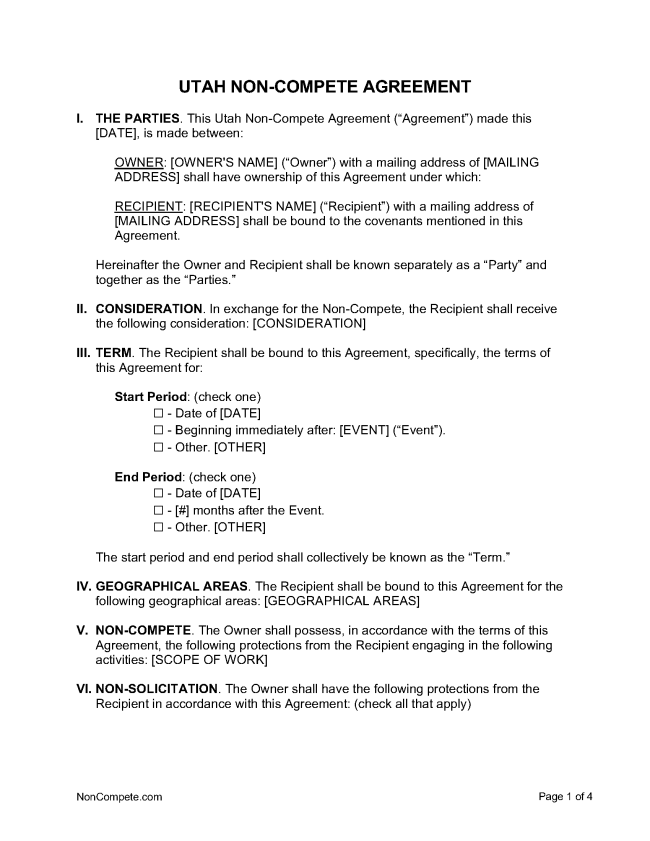A Utah non-compete agreement is a contract that places certain restraints on an individual’s ability to participate in a given profession or trade. Also called a “restrictive covenant” or “covenant not to compete,” non-compete contracts are subject to strict requirements and limited to a duration of one year for employees. Non-competes arising in the sale of a business are enforced more liberally.
Table of Contents |
Are Non-Competes Enforceable in Utah?
Yes, non-competes may be enforceable in Utah if they are truly necessary to protect a business and do not threaten the public interest in freedom of trade. (System Concepts, Inc. v. Dixon (1983))
To be valid and enforceable, non-compete agreements must meet the following prerequisites:
- The agreement was negotiated in good faith
- The agreement covers only what’s necessary to protect the business against unfair competition
- The agreement is supported by consideration (each party must give something up and receive something of value)
- The timeline and geographic scope of the agreement are reasonable
In 2016, a statutory time limit of one year was placed on all employer-employee non-compete agreements. Covenants created after that date are subject to the one-year maximum term, with the clock starting on the end date of employment. (§ 34-51-201)
Reasonableness
Courts will consider a number of factors when evaluating whether a non-compete agreement is reasonable, including the hardship placed on the employee and the nature of the enforcing party’s interests. (Robbins v. Finlay (1982))
A non-compete agreement cannot place sweeping restrictions on a person’s business activity once they leave the company. This would interfere with their personal liberty, their ability to practice in their profession, and the public interest in economic freedom.
However, a business has a right to protect certain proprietary information, investments in training, or other valuable assets. Legitimate business interests that can be protected by non-compete agreements include:
- Trade secrets (§ 13-24-2(4))
- Specialized training or education
- Unique knowledge specific to the business
- Goodwill (the company’s non-tangible assets, like customer relationships)
This system prevents a former employee or the seller of a business from going on to replicate a company’s business model, take their customers, or otherwise unfairly compete by setting up shop in the immediate territory of that business. (Kasco Services Corp. v. Benson (1992))
Attorneys (prohibited)
Outside the scope of agreements concerning retirement benefits, attorneys are prohibited from entering any contracts that seek to restrict their right to practice law. A lawyer cannot enter a traditional employee-employer non-compete agreement, nor may they agree not to represent a person (or not to practice) as part of a settlement agreement. This rule does not apply to non-compete agreements involving the transfer of ownership of a law firm. (Utah R. Prof. Cond. 5.6)
Broadcasting (restricted)
Special restrictions apply to non-compete agreements in the broadcasting business. In addition to following the other rules for validity, non-competes must meet the following requirements to be enforceable against a broadcasting employee:
- The employee is classified as exempt
- The agreement is part of a written employment contract that is reasonable in light of industry standards, the individual’s position, and the scope of limited activity
- The employee is terminated for cause or breaches the employment contract
Terminating an Employee
Non-compete agreements survive the termination of an employment relationship. If an employee is discharged in good faith, existing non-compete agreements are still enforceable to the extent that they are otherwise valid. (Allen v. Rose Park Pharmacy (1951))
Burden of Proof
The burden of proof as to the validity of a non-compete agreement falls upon the party seeking to enforce the contract. (System Concepts, Inc. v. Dixon (1983))
Continued Employment (consideration)
If a person signs a non-compete agreement before starting a job, the promise of future employment is sufficient consideration to support the agreement. If a non-compete is entered during the course of employment, there must be a change in the terms of employment, such as a promotion or raise. (System Concepts, Inc. v. Dixon (1983))
Maximum Term
Non-compete agreements ancillary to employment contracts cannot exceed one year following the end of the employment relationship. (§ 34-51-201) This rule does not apply to restrictive covenants arising in the sale of a business. In these transactions, the court will consider what is reasonable under the circumstances. Non-competes with term limits as high as 25 years have been upheld. (Valley Mortuary v. Fairbanks (1950))
Blue Penciling
It’s not clear whether courts have the ability to reform non-compete agreements in Utah. In one case, a court inferred a nationwide geographic limitation where the agreement omitted specific instructions. (System Concepts, Inc. v. Dixon (1983))
